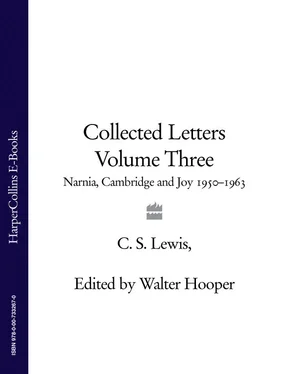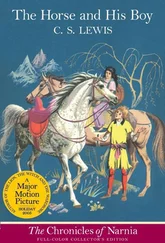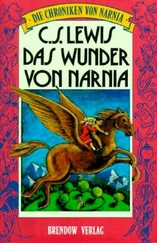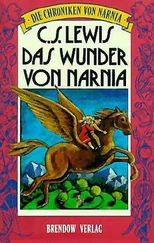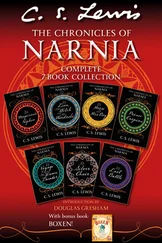The snatches of ‘modern’ poetry on p. 62 are exactly like it: you might have been reading Rostrevor Hamilton’s The Tell-Tale Article , but it was not published then. 130 The Voice is excellently managed. The most important thing is that (this time) I was really interested in the crisis it depicts throughout, wh. is significant because it never was my crisis.
Craigie’s Dark Atlantis 131 has come and is an almost total disappointment. I don’t think he has much real imagination: and he certainly can’t write at all. The good reviews and the high praise from Grahame Greene (who certainly can write himself, whether one likes his books or not) alarm me. We here catch the critics on the sort of book we do understand, and that shows them to be without any standards at all. (Craigie thinks rights means rites and that the Atlanteans had a metal called ORICHALEUM! 132 We are in the post-literate age
Yours
Jack
TO HARRY BIAMIRES (BOD):
Coll. Magd.
24/6/52
Dear Blamires
Yes, of course. I am sorry the book has not yet found a home. All the best.
Yours
C. S. Lewis
TO MARY VAN DEUSEN (W):
Magdalen College,
Oxford. 26/6/52
Dear Mrs. Van Deusen–
Incense and Hail Marys are in quite different categories. The one is merely a question of ritual: some find it helpful and others don’t, and each must put up with its absence or presence in the church they are attending with cheerful and charitably humility.
But Hail Marys raise a doctrinal question: whether it is lawful to address devotions to any creature , however holy. My own view would be that a salute to any saint (or angel) cannot in itself be wrong any more than taking off one’s hat to a friend: but that there is always some danger lest such practices start one on the road to a state (sometimes found in R.C.’s) where the B.V.M. 133 is treated really as a deity and even becomes the centre of the religion. I therefore think that such salutes are better avoided. And if the Blessed Virgin is as good as the best mothers I have known, she does not want any of the attention which might have gone to her Son diverted to herself.
It seems, nevertheless, quite clear that the Spirit of God is, or is more strongly with Kemper Hall than with P. A. Wolfe. In him you describe a type I know. I think we may except [accept] it as a rule that whenever a person’s religious conversation dwells chiefly, or even frequently, on the faults of other people’s religions, he is in a bad condition. The fact that he shakes your faith is significant. Pray for him but not, I shd. say, with him. If he insists on talking religion to you ask him for positive things: ask him to tell you what he knows of God.
All blessings. My ‘new trouble’ is still there: but I have much to be thankful for.
Yours
C. S. Lewis
TO MISS REIDY (P): TS
REF.52/265.
Magdalen College,
Oxford.
28th June 1952.
Dear Miss Reidy,
The point 134 was that as foolish people on a walk, when by their own errors they are off the course, think the map was wrong, so, when we do not find in ourselves the fruits of the Spirit which all our teachers promise, it is not that the promise was false, but that we have failed to use the Grace we have been given. The ‘map’ can be found in almost any Christian teaching.
C. S. Lewis
TO ARTHUR GREEVES (BOD):
Magdalen College.
28th June 52
My dear Arthur
Splendid. The manageress is right: Aug 21st is my first night at Crawfordsburn. Setting off with you on Mon. 25th will do fine. And of course I don’t want all day & every day in the car: we think just the same on that subject. I look forward to the trip immensely: the first time you and I have been away together since Portsalon in about 1916! 135 This time we shall at least not quarrel about Hair-Oil!
Yours
Jack
TO GEOFFREY BLES (BOD): 136
Coll. Magd.
28/6/52
My dear Bles,
Mycroft has been ill, 137 but is now better. I don’t foresee many occasions for copies of Le Lion, 138 but if you will kindly send me 2, they might come in useful. The translator deserves to be congratulated of course—French is a v. powerful language—the children become perfect little Frenchmen, but that is all to the good. What pleased and surprised me is the passage at the end where I made them talk like characters in Malory, and he has really got some of the quality of the French 13th century prose romances: grande honte en aurions 139 – is exactly right.
May I have 10 copies of M.C.? 140 I had my first bathe at Parsons’ Pleasure yesterday: 68°. 141
Yours
C. S. Lewis
TO WAYLAND HILTON YOUNG (W):
[Magdalen College]
1/7/52
Dear Hilton Young,
(Shall we drop the honorifics on both sides?) Thanks very much for two copies of the C.J. 142 As I said before, it is almost impossible to make an objective judgement on criticism of oneself, especially when it does one so very proud. But I suspect that your essay is a good one. Certainly the alterations have been made with great skill–invisible mending.
I’m glad Driver played up. I suppose he told you, as he told me, that Judith is already a novel. 143 I still hope that as you poke about among the realien they will blaze up and a new story will arise relegating Judith to the background.
What do you think of Hesse’s Glasperlenspiel , which I’ve just read in a v. bad translation? 144 Heavy, humourless. But has one merit wh. sets it apart from all other stories about the future. Unobtrusively, without any new machines or new forms of government, it really does give you the illusion of a society in which the general quality of thought is different from ours. I don’t think Wells or Aldous Huxley did that: nor Orwell, except in the epilogue on Newspeak. 145
All the best, and many thanks.
Yours
C. S. Lewis
TO VERA GEBBERT (W): TS
REF.52/103.
Magdalen College,
Oxford.
3rd July 1952.
Dear Mrs. Gebbert,
We both enjoyed your very interesting letters, and are glad to know that you are so happy. Pity about the antelopes, but inevitable. And we look forward greedily to the promised food parcel. Sun Valley Lodge looks a lovely place, and I hope that I may have the good fortune to see it some day. Here is the translation of the Latin:–Many things will be re-born which have now fallen (into disfavour), and many will fall (into disfavour) which are now fashionable. 146
With all best wishes to you both,
yours sincerely,
C. S. Lewis
Mere Christianity: A Revised and Amplified Edition, with a New Introduction of the Three Books, ‘Broadcast Talks’, ‘Christian Behaviour’ and ‘Beyond Personality’ was published by Geoffrey Bles of London on 7 July 1952 .
TO MARG-RIETTE MONTGOMERY (W): TS
REF.52/248.
Magdalen College,
Oxford.
8th July 1952.
Dear Miss Montgomery,
Of course they 147 are right in making the Resurrection a cosmic event: what I am not so sure is whether they really regard Christ as the only-begotten Son of the only God.
Yours sincerely,
C. S. Lewis
TO DON GIOVANNI CALABRIA (V):
e Coll. Stae Mariae Magdalenae
Jul. XIV. MCMLII
Gratias ago, dilectissime pater, et pro opusculis Congregationis vestrae et pro hac epistolâ Jul vii datâ. Hora nostra, ut dicis, gravis est: utrum gravis ‘prae omnibus humanae historiae’ nescio. Sed semper malum quod proximum et gravissimum videtur esse; est enim, ut oculis, sic cordibus, sua ‘perspettiva’. Si tamen nostra tempestas rê verá pessima est, si rê vera Dies Illa nunc imminet, quid restât nisi ut gaudeamus quia redemptio nostra iam proprior est et dicamus cum Sancto Joanne ‘Amen; cito venias, domine Iesu.’ Interim sola securitas est ut Dies nos inveniat laborantes quemque in suo officio et praecipue (dissensionibus relictis) illud supremum mandatum ut invicem diligamus implentes. Oremus semper pro invicem. Vale: et sit tecum et mecum pax illa quam nemo potest auferre.
Читать дальше
